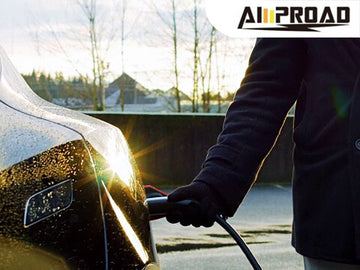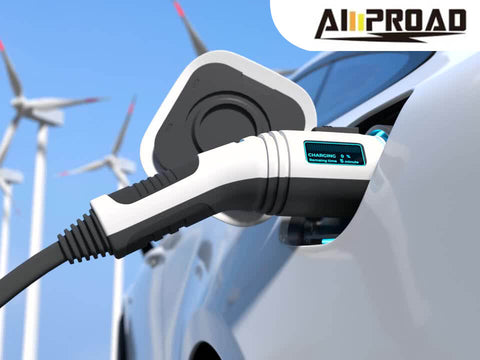
Ditch the gas station woes! Owning an electric vehicle (EV) is exciting, but questions about charging can arise. Is home charging the champion compared to public stations? Absolutely! Here we will show you why. We'll unveil the champion's secret moves: convenience of charging at home, potentially lower costs, and the control you have over the process. Public charging stations still play a role, and we'll explore when they might be your best bet. So, get ready to transform your EV ownership experience with the power of at-home charging!
Convenience & Cost Advantages of Home Charging
Charging your electric vehicle (EV) at home offers significant convenience and cost advantages over using public charging stations. Let’s explore how at-home charging compares to public charging in terms of ease and expense.
How convenient is at-home charging compared to public stations?
Charging your EV at home is incredibly convenient. With a home charger, you can recharge your vehicle without leaving your driveway. This level of convenience is especially appreciated during inclement weather or late-night hours when going to a public charging station might be less appealing.
Can I simply plug in my EV overnight at home?
Absolutely. One of the main benefits of at-home charging is the ease of plugging in your EV overnight. This can be done using a standard outlet or, for faster charging, a Level 2 charger. The AMPROAD portable Level 1 and Level 2 dual-use EV charger makes this process even more straightforward. It offers the flexibility to charge at either 120 volts (Level 1) using a 14-50r adapter or 240 volts (Level 2), ensuring that you wake up to a fully charged vehicle every morning. This dual-use capability means you can adapt your charging method based on your needs, whether you’re looking for a quick charge or a more extended overnight session.
How does this compare to the time and effort required to find and use public stations?
Finding and using public charging stations can be time-consuming and sometimes frustrating. You need to locate a nearby station, which may not always be available or convenient. Once you find a station, you might have to wait for an available charger, especially if it's a busy location. This process can take significantly more time and effort compared to the simplicity of plugging in your EV at home, where your charger is always available and ready to use.
Is at-home charging generally cheaper than public charging?
Charging your EV at home is generally more cost-effective than using public charging stations. The cost of electricity at home is typically lower than the rates charged at public stations, especially when you take advantage of specific home energy plans.
What factors influence the cost of charging at home versus public stations?
Several factors influence the cost of charging your EV at home compared to public stations. At home, your electricity rate is determined by your utility provider and can vary based on your usage and the time of day. Public charging stations often have higher rates because they include the cost of infrastructure, maintenance, and convenience. Additionally, some public stations charge a fee based on the time spent charging or the amount of electricity used, which can add up quickly if you're relying on them frequently.
Can I take advantage of off-peak electricity rates for home charging?
One of the significant advantages of home charging is the ability to take advantage of off-peak electricity rates. Many utility companies offer lower rates during off-peak hours, typically late at night or early in the morning. By charging your EV during these times, you can significantly reduce your electricity costs. The AMPROAD dual-use portable charger EV Level 1 and Level 2 is perfect for this, as you can set it to charge during these cheaper, off-peak hours, maximizing your savings.
In short, charging your EV at home with a versatile charger like the AMPROAD portable Level 1 and Level 2 dual-use EV charger is both convenient and cost-effective. It saves you the time and effort of finding and using public charging stations and allows you to take advantage of lower electricity rates, making it an excellent choice for most EV owners.
Control and Reliability Factors

Charging your electric vehicle (EV) at home offers significant control and reliability advantages over using public charging stations. Let’s explore how home charging provides you with more control and why it’s generally more reliable.
Do I have more control over the charging process at home?
Charging your EV at home gives you unparalleled control over the entire process, from timing to energy usage.
Can I schedule charging times at home to optimize costs or energy usage?
The answer is yes, you can schedule your charging times at home to optimize costs and energy usage. Many home chargers, including advanced Level 2 EV chargers, come with features that allow you to set specific charging times. For example, you can program your charger to power up during off-peak hours when electricity rates are lower. This not only reduces your energy bill but also helps manage the load on the grid more efficiently. Some chargers even offer smart features that sync with your utility’s time-of-use rates, automatically adjusting charging times for maximum savings.
How does this compare to the availability and potential wait times at public stations?
In contrast, public charging stations often lack the flexibility of scheduled charging. You are subject to the availability of the station such as Tesla destination charger and may have to wait if chargers are occupied. This can be particularly inconvenient during peak hours or in busy locations where EV usage is high. At home, you have the convenience of plugging in your EV whenever it suits you, without worrying about finding an available charger or waiting for one to free up.
Is at-home charging a more reliable option than public stations?
At-home charging is generally more reliable than public stations, offering consistent access and functionality.
What are the potential issues with malfunctioning or occupied public chargers?
Public charging stations can sometimes be unreliable. You might encounter stations that are out of order, malfunctioning, or already occupied by other vehicles. This can lead to significant delays and inconvenience, especially if you are on a tight schedule or in an unfamiliar area. Additionally, not all public chargers are maintained to the same standard, which can result in varied performance and reliability.
Does at-home charging offer greater peace of mind regarding access and functionality?
Yes, at-home charging offers much greater peace of mind. With a home charger, you have the assurance that your charging station is available whenever you need it. This eliminates the uncertainty and stress associated with finding a working, available public charger. Investing in a Level 2 EV charger for your home can further enhance this reliability, providing faster charging times and greater efficiency.
Moreover, having a dedicated home charger means you can regularly monitor and maintain it, ensuring it remains in optimal working condition. This contrasts sharply with public stations, where you have no control over the maintenance and reliability of the equipment.
Ultimately, charging your EV at home, especially with a Level 2 EV charger, provides superior control and reliability compared to public charging stations. You can schedule your charging times to take advantage of lower electricity rates, and you won’t have to deal with the potential issues of malfunctioning or occupied public chargers. This control and reliability offer significant peace of mind, making at-home charging the preferred option for many EV owners.
Are there any limitations to consider with at-home charging?

At-home charging boasts undeniable advantages, but it's important to consider a few factors before taking the plunge
Do I need a specific electrical outlet or installation for home charging?
Most homes in the United States and Canada are equipped with standard 120-volt outlets, which can be used for Level 1 charging – the slowest charging option for EVs. However, a Level 1 charger can take a very long time to fully replenish your battery, often overnight or longer. To significantly reduce charging times, most EV owners opt for a EVSE Level 2 charger, which can be installed in their garage or dedicated parking space.
Installing a Level 2 EV charger typically requires a 240-volt outlet, similar to the kind used for dryers or ovens. If your home doesn't have a pre-existing 240-volt outlet in your desired charging location, you'll need to have one installed by a qualified electrician.
What are the potential costs associated with setting up a home charging station?
The cost of setting up a home charging station can vary depending on several factors, including:
The cost of the Level 2 EV charger itself: Prices range from around $300 to $1000, depending on features and brand.
Electrical work required: If you need a 240-volt outlet installed, expect to pay an electrician between $200 and $800, depending on the complexity of the job.
Local permits and inspections: Some localities may require permits or inspections for EV charger installations, which can add a nominal cost.
While there's an upfront investment involved, the long-term benefits of home charging often outweigh the initial costs. The convenience, potential cost savings on electricity compared to public stations, and the control you have over the charging process can make home charging a worthwhile investment for most EV owners.
Tip: Many utility companies and local governments offer rebates or incentives to encourage home EV charging. Check with your local providers to see if you qualify for any financial assistance.
Are there situations where public charging is still beneficial?
Home charging reigns supreme for daily commutes and errands, but there are a few situations where public charging stations come to the rescue.
What if I'm taking a long trip exceeding my EV's home charging range?
Even with the increasing range of EVs, road trip enthusiasts might still find themselves exceeding their home charging range. This is where public charging stations, particularly DC Fast Chargers, become your knight in shining armor. DC Fast Chargers can deliver a significant amount of power in a relatively short time, allowing you to get back on the road quickly and resume your adventure. While planning a road trip with an EV requires a bit more forethought compared to a gas-powered vehicle, the readily available network of public charging stations makes these journeys entirely possible.
Tip: Utilize trip planning apps or websites specifically designed for EVs. These tools can factor in EVCS locations, charging times, and even real-time availability to help you map out your route efficiently.
Are there any other scenarios where public charging might be the preferred option?
While home charging is ideal for everyday use, there are a few other situations where public charging stations might be the preferred option:
- Limited home charging availability: If you live in an apartment building or a place with limited parking and no designated charging spot, public charging stations can be a lifesaver.
- Quick top-up: Need a quick boost before heading to an appointment or meeting? Depending on the type of public charger, you might be able to squeeze in a top-up during your errand.
- Exploring a new city: Public charging stations can be a convenient way to keep your EV juiced up while you're out exploring a new city.
Ultimately, the beauty of EV ownership lies in having options. Home charging provides unmatched convenience and cost-effectiveness for daily use, while public charging stations offer the flexibility and freedom to explore beyond your home charging range.


